While Our Police Kill Thousands, Congress Works to Protect the Police
What makes the ongoing slaughter of Americans at the hands of our police so troubling—as if that’s not enough—is how rare it is for any cop to end up in jail for one of these murders.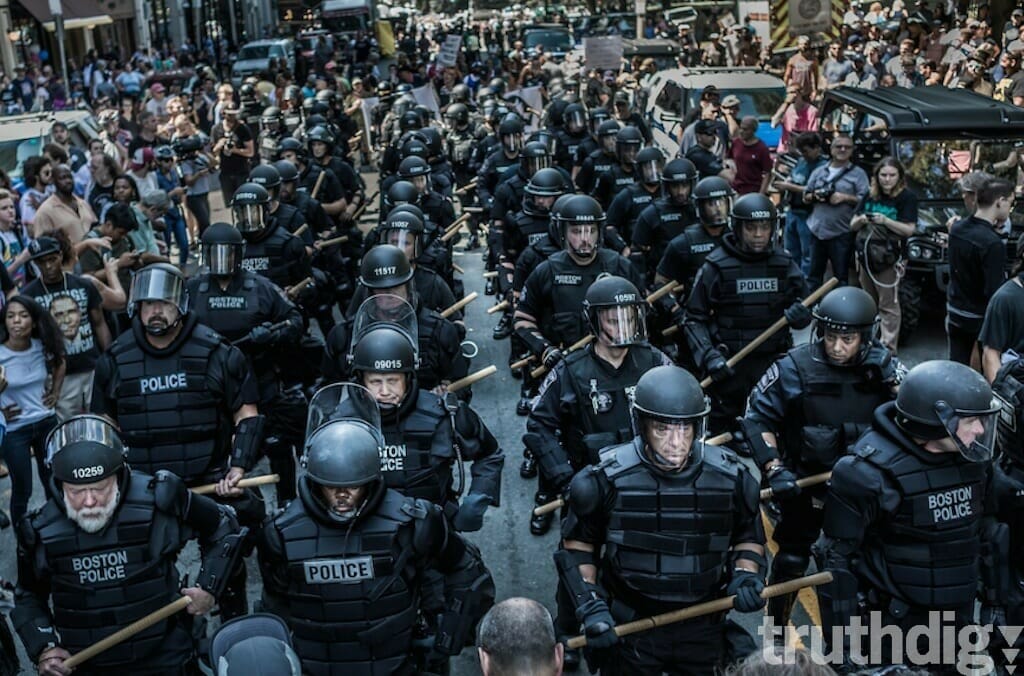 Police in Boston for a 2017 protest to a "free speech rally" organized by the Boston Free Speech Coalition. (Michael Nigro / Truthdig)
Police in Boston for a 2017 protest to a "free speech rally" organized by the Boston Free Speech Coalition. (Michael Nigro / Truthdig)
As you read this, an American police officer will kill someone.
Or at least—statistically speaking—it’s likely that in the next few hours an American police officer will extinguish the life of a fellow American. And it’s an almost certainty that that person will not need to die.
How do I know this? Because our police kill roughly three people per day. American police murder more citizens in an average two-week period than cops in the United Kingdom killed in the entire 20th century. (But in their defense, for a lot of the 1900s, British bobbies were only armed with a stick. So I imagine murdering citizens took quite a lot of time and commitment, perhaps multiple guys working in shifts. Point is, there were likely very few accidental murders at the business end of the stick.)
But now the world’s police almost all have guns, and this problem has become exponentially worse in America. At the beginning of May, U.S. police had already killed 400 people in 2018. To give you something to compare that with, in the 12 months preceding April 2016, British cops killed only three people and fired their weapons only seven times. Seven times in a year! (I imagine your average American cop discharges his or her weapon seven times just to open a beer can when the little metal tab breaks off. And once they get it open, they fire three more shots in the air to celebrate.)
So right now you’re thinking, “I’ve read 15 columns on how many police murders we have. I don’t need another one.” However, this column is different. This one comes on the heels of Congress actually standing up and doing something about this issue in a bipartisan move (more on that in a moment).
What makes the ongoing slaughter of American people at the hands of our police so troublesome—as if that’s not enough—is how incredibly rare it is for any cop to end up in jail for one of these murders. Of all of the 1,147 police killings in 2017, officers were charged with a crime in only 13—1 percent of all killings by police.
Well over half of all those killings began with police responding to suspected nonviolent offenses or scenarios in which no crime was reported. Think about that for a moment. Half the time police officers murder someone, they weren’t handling a violent crime and often were dealing with no crime at all. Basically, they thrust themselves into somebody’s life, things escalated—as they tend to do when dudes with guns show up—and it ended with a state-sanctioned murder.
In a little over half of the killings, the victim had a gun. Most who were completely unarmed were people of color. This is an important point, because proponents of police murder (I don’t think they call themselves that, but I do) argue that cops kill more white people than black people and therefore these killings are not racist. (For the moment, I’ll put aside how odd it is to argue, “Don’t worry—we’re all being killed for no reason. So it’s fine.”) Yes, it is true that cops kill a lot of white people. They kill more white people than Wendy’s trademarked Baconator sandwich. However, cops kill more people of color than the population percentages would dictate, and they’re more likely to kill people of color who aren’t armed at all. So while whites do lose their lives in our current police state at a ridiculous rate, they are far more likely to be waving around a gun when it happens.
Clearly, part of the problem is that U.S. police officers have almost no fear that murdering someone could land them in trouble. Another piece of the problem is that, on average, police recruits get eight hours of training on how to de-escalate a situation. They get 58 hours of training on how to shoot things. So it appears that shooting things is roughly seven times more important than trying to avoid shooting things!
Let’s be honest. Eight hours of training is nothing. I received more than eight hours of training on how to put on a condom in sixth-grade sex ed—which I guess could also be called “gun safety.” Granted, this particular gun-safety training was pressed upon our young minds by the gym coach who doubled as our sex ed teacher (this, by the way, is one of the most horrific experiences any kid can go through. Inevitably, the first question from the most annoying kid in the class is, “Um, coach, how do we get a girl to want to have the sexual intercourse with us?” And the coach will respond, “Son, if I knew that I wouldn’t be teaching fuckin’ frisbee to groups of shit-for-brains! I’d be a millionaire selling books on how to get laid. My dog learned how to play ball quicker than you sorry sons of bitches”).
Where was I? Ah, yes, de-escalation. If police had not shot those who weren’t armed with a gun, 638 more Americans would have lived to see 2018. That’s a 57 percent decrease in police killings.
In any profession other than that of police officer, this would be wholly unacceptable. If roofers or baristas or hair stylists were murdering more than 1,000 people a year, hundreds of them unarmed, I don’t think our society would be slow to respond (and I, for one, would want to know what the hell the haircuts looked like that people were still willing to brave the procedure).
But luckily, we are an evolved country. We have elected representatives who stand up for the people and defend the voters when something like this is happening. And sure enough, the House of Representatives did indeed pass a bill a couple weeks ago concerning police.
They passed the Protect and Serve Act of 2018, with only 35 representatives voting against it. This is impressively shocking considering that our current Congress usually reserves that level of bipartisanship for bills giving themselves a raise or approving war criminals for Cabinet positions. But rather than helping innocent civilians, the Protect and Serve Act creates enhanced penalties for anyone who intentionally causes harm to law enforcement officers.
Does that mean up until now it was legal to harm a law enforcement officer? I had no idea.
Seriously, what problem is this solving? Were loads of people punching cops in the face and then yelling, “Ha Ha! You may not like it, but it’s well within my rights to beat the shit out of a cop!” No, I don’t think that was a problem at all. As The Intercept put it, “[Blue Lives Matter] bills exemplify the very worst sort of legislation: at once unnecessary and pernicious.”
The bill is intentionally vague on what qualifies as a law enforcement officer and what qualifies as “intentionally causing harm,” opening the door for even more draconian punishment of activists and protesters who get caught up in a melee and are charged with assaulting a cop, as was Occupy Wall Street protester Cecily McMillan.
But it is true that even a single officer getting killed is too many, and therefore, thank goodness Congress finally made murdering police officers illegal. … Oh wait, it was already highly illegal. When was the last time you saw a cop killer in the courtroom with his lawyer saying, “But your honor, it was just a police officer. It’s not like the defendant murdered a mailman or a window washer or an adorable bunny rabbit.”
As professor Alex Vitale states in his excellent book, “The End of Policing,” uniformed police officers average only one felony arrest a year, meaning that most of what police do is stand around trying to find citizens to harass for small or nothing crimes. They slam heads against the pavement for such violations as having an open beverage or causing a disturbance. The vast majority of cops are not fighting comic book villain Lex Luthor. And on the rare occasion you see police dressed up in their storm trooper riot outfits, they’re usually getting ready to “deal with” peaceful protesters, or maybe some Native Americans who have the gall to demand clean water, or perhaps some black people who have the nerve … to be black people.
So if thousands of Americans were killed by police over the past decade—about half of them not even holding a gun at the time of their murders—why did Congress just fall all over itself to make assaulting police even more illegal? As Natasha Lennard put it in The Intercept, “In our justice system, ‘blue lives’ are already considered to matter the most—which is why police appropriation of the call for black lives to matter is so sickening. … The same ideological commitment to police-as-persecuted underpins FBI efforts to frame Black Lives Matter activists as potential ‘black identity extremists’—a designation, conjured from thin air, that claims anti-racist activism is breeding a terroristic targeting of cops.”
The solution? We need to heavily decrease and demilitarize our police forces. We don’t need men and women with guns—above the law—running around our streets at all times. We should largely switch to community policing, in which unless it’s a truly deadly situation, you don’t call the cops. You don’t invite armed maniacs with a single lazy afternoon of de-escalation training into your neighborhood. Don’t call the cops because your neighbor’s music is too loud or some kids are fighting or you smell marijuana or a pig won’t stop following you home.
Yes, last week an Ohio man called the police on a pig that was following him home. He apparently thought, “The only people who can handle this situation are dudes with guns.”
How much do you want to bet that the guy who called those cops is white? Only a white guy figures the cops will help him in such a situation. If a black man called the cops to deal with a wayward pig, they’d probably shoot him. And then the following day, the cover of the local newspaper would read, “Violent African-American Shot by Police While Trying to Steal Award-Winning Pig.”
If you liked this column, please share it. And check out Lee Camp’s television show “Redacted Tonight” and podcast “Common Censored.”
Your support matters…Independent journalism is under threat and overshadowed by heavily funded mainstream media.
You can help level the playing field. Become a member.
Your tax-deductible contribution keeps us digging beneath the headlines to give you thought-provoking, investigative reporting and analysis that unearths what's really happening- without compromise.
Give today to support our courageous, independent journalists.
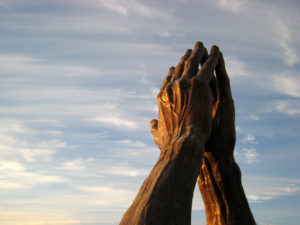
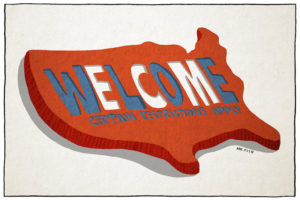
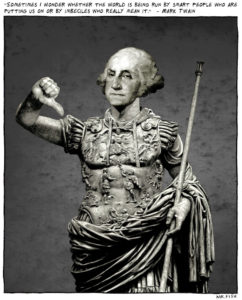

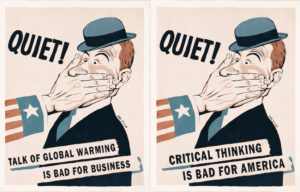
You need to be a supporter to comment.
There are currently no responses to this article.
Be the first to respond.